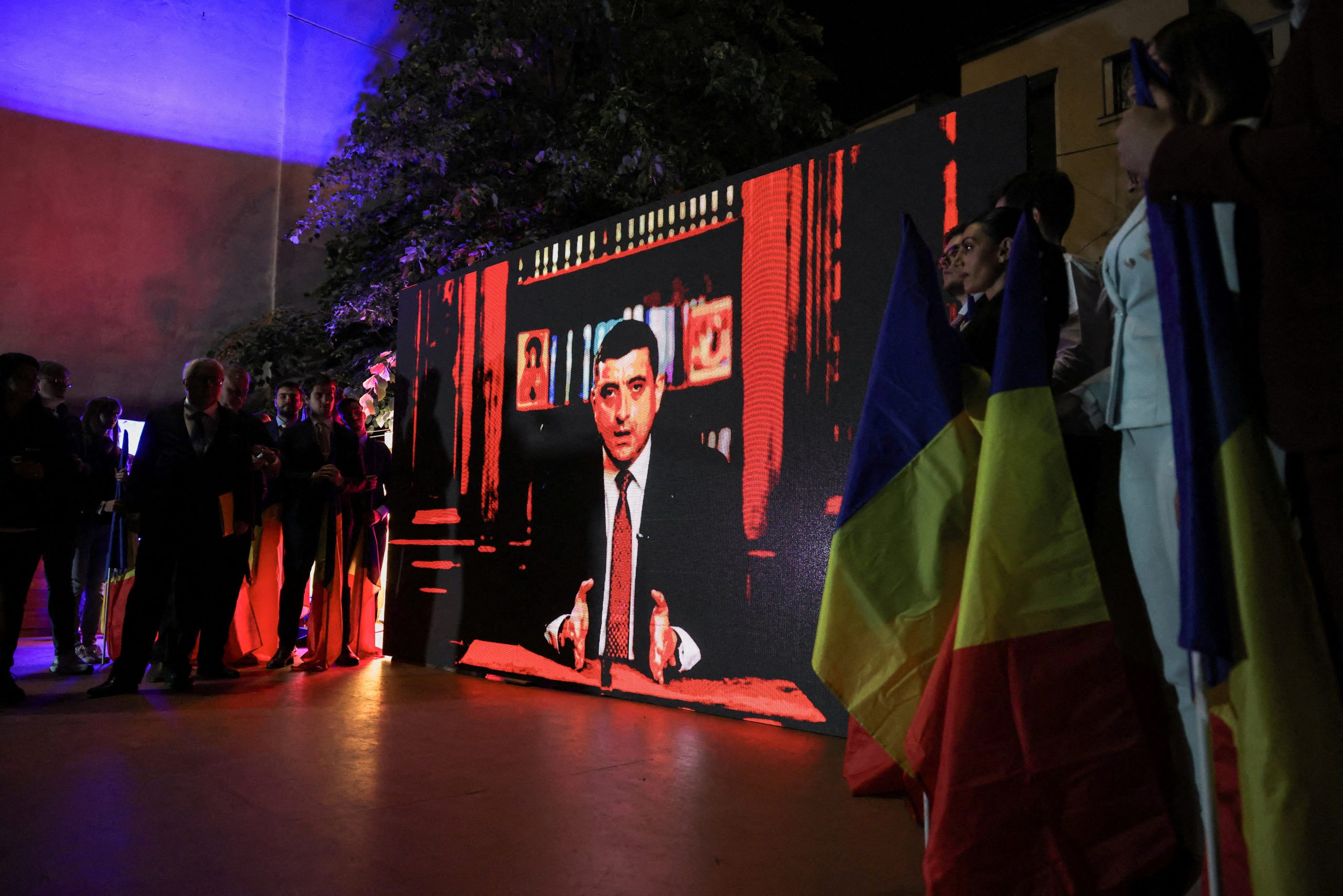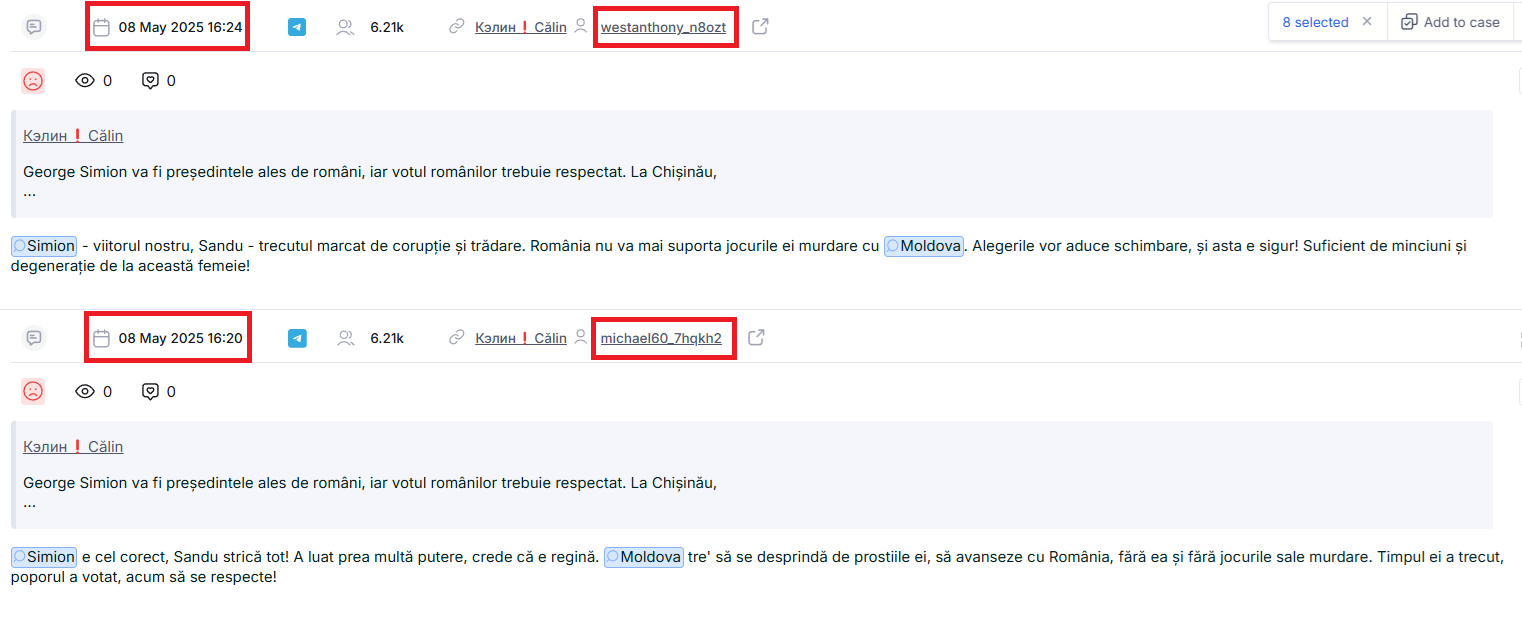From Bucharest to Chisinau: How pro-Kremlin networks shaped Romania’s 2025 election
Russia-aligned actors in both Romania and Moldova consolidate support for George Simion in final days of campaign.
From Bucharest to Chisinau: How pro-Kremlin networks shaped Romania’s 2025 election
Share this story

As Romania votes in a pivotal presidential election, far-right candidate George Simion has emerged as a frontrunner, aligning himself with Kremlin narratives and increasingly elevated by pro-Russian actors who once denounced him as a “fascist.” This surge of support from Russia-aligned networks in both Romania and Moldova further raises the stakes for an election with profound consequences for NATO, the defense of Ukraine, and the trajectory of Romania-Moldova relations.
The vote follows the unprecedented annulment of the country’s 2024 presidential election, which the Constitutional Court invalidated on December 6, 2024, citing credible allegations of Russian interference that benefited far-right candidate Călin Georgescu. Georgescu, an ultranationalist and self-described sovereigntist (one who favors unification between Romania and Moldova), had unexpectedly led the first round of the annulled vote. However, he was barred from running in 2025 by the Central Electoral Bureau and the Constitutional Court due to violations of electoral regulations, including opaque campaign financing and suspected Russian-backed online operations—allegations that Moscow denied.
The DFRLab previously documented suspicious online activity surrounding the 2024 campaign, including coordinated efforts on Telegram and TikTok to amplify Georgescu’s messaging. His exclusion from the 2025 race, confirmed by the court on March 11, galvanized Romania’s far-right electorate, which has since rallied around Simion, leader of the Alliance for the Union of Romanians (AUR).
In some ways, Romania’s election is also a Moldovan one. Romania and Moldova share a deep historical bond, having been part of the same state, Greater Romania, until 1940, when the Soviet Union annexed Bessarabia, present-day Moldova. This legacy continues to influence political discourse on both sides of the border. Today, nearly one-third of Moldova’s population holds dual citizenship, granting them the right to vote in Romanian elections and positioning them as an important electoral demographic.
This analysis offers a narrative review of Simion’s candidacy, exploring his controversial history in Moldova and examining how pro-Russian actors there have shifted from labeling him as a “fascist” a decade ago to endorsing him as a “sovereigntist” in 2025. It also traces Simion’s transformation from an anti-Russian unionist to a promoter of Kremlin-aligned narratives. Simion has also benefited from the amplification efforts of Ilan Shor’s network, which has become infamous for using inauthentic social media accounts to promote anti-West and anti-EU narratives within Moldova.
Who is George Simion, and why is he controversial in Moldova?
Simion emerged as a leading unionist figure in 2011, founding Acțiunea 2012 (“Action 2012”) to advocate for the reunification of Romania and Moldova. Simion’s activism propelled him into politics as he secured a parliamentary seat in 2020 and won a re-election bid in 2024. In 2025, Simion became a presidential frontrunner with a platform that blended nationalism, Euroscepticism, and anti-establishment rhetoric, similar to Georgescu’s platform.
Simion’s unionist agenda, which dismisses Moldova as a “failed state,” has provoked backlash in the country. Yet Simion’s anti-Moldova posturing also had effect another result, turning him into a symbolic threat that could be exploited by Moldova’s Kremlin-aligned groups, who have previously invoked fears of unionist aggression to elect pro-Russian candidates.
Although Simion’s unionist movement initially promoted strong anti-Russian messaging, in Moldova his behavior is often viewed as serving the Kremlin’s interests as he is portrayed as the “perfect enemy.”. Pro-Russian actors have used his calls for unification with Romania to fuel fear and division, portraying the movement as a threat to Moldovan identity and sovereignty. In this context, Simion is viewed by some observers as advancing narratives that contribute to divisions within Moldovan and align with Moscow’s strategic interests in the region.
In Moldova, Simion is viewed as a security threat. The country has repeatedly banned him from entry (2009, 2014, 2015, 2018), with the latest restriction extended until 2028, citing national security concerns. Ukraine declared him persona non grata in 2021. Simion was accused by the former Moldovan Defense Minister Anatol Șalaru and former Security Service of Ukraine Head Oleksandr Skipalskyi of meeting an FSB officer in Ukraine in 2011 – allegations Simion denounced as a “smear campaign.” In April 2025, Simion lost the first round of a defamation lawsuit he filed against Șalaru in which he sought a retraction of Salaru’s claims that he had ties to Russian intelligence services.
From anti-Russian activist to Kremlin-aligned politician
Simion’s rhetoric has undergone a marked transformation from fervent anti-Russian activism to supporting positions increasingly aligned with the Kremlin.
2009-2015: Initially overtly anti-Russian, Simion used Acțiunea 2012 to criticize Moscow’s influence through protests featuring “Bessarabia is Romania” slogans and graffiti campaigns targeting pro-Russian elites in Moldova.
2019-2022: Upon entering Romanian politics with AUR, Simion’s rhetoric on Russia softened but remained critical of Moldova’s political establishment. He opposed funding Moldova’s government, labeling it “anti-Romanian separatism,” and declared he “hates the artificial state called the Republic of Moldova.” The Romanian government is a key partner to Moldova, providing millions in development and humanitarian aid across sectors like education, health, cybersecurity, and justice.
2023-2025: Simion became increasingly aligned with Russian messaging during this period. He opposed military aid for Ukraine, claimed “Russia is not a significant threat to NATO,” and voted against legislation allowing Romania to shoot down airspace violating drones. In a 2025 podcast with Florian Capsali, he described Ukraine as a “Soviet creation” and the Russia-Ukraine war as a “war between Orthodox Christians.” During a May 2025 Euronews debate, in regard to Russia-Ukraine, he advocated “neutrality, not escalation,” demanded Ukraine compensate Romania for aid, including Patriot systems, and called military assistance a “national betrayal.”
Conspicuous endorsement by Moldova’s pro-Russian factions
For years, pro-Russian politicians in Moldova have exploited Simion’s unionist activism to incite panic, particularly in Gagauzia and Transnistria. A notable example occurred in February 2014, when Gagauzia held an illegal referendum in which 98.9 percent of participants expressed support for independence should Moldova “lose its sovereignty” – despite no actual unification plans from either Romanian or Moldovan governments.
As recently as 2018, former Moldovan President Igor Dodon explicitly labeled Simion’s AUR party and its supporters as “fascists.” Yet by May 2025, Dodon publicly endorsed Simion ahead of Romania’s presidential elections, even revealing plans to rebrand his Party of Socialists as the “Party of Sovereigntists of Moldova” to align with Simion and other similar movements in Europe. Some critics have speculated that Simion’s unionist movement might have, from the beginning, been influenced, or even created, as part of a Russian strategy; for these critics, Dodon’s endorsement served as validation. This dramatic pivot highlighted growing synchronization among Kremlin-aligned forces across Eastern Europe.
Following the May 4, 2025 first round vote in Romania’s election, Dodon told Russia’s TASS news agency that “if frontrunner Simion wins the second round, it will create significant problems for [Moldovan president] Maia Sandu and her ruling PAS party, which banned his entry to Moldova and spread fakes about his alleged ties to Russian special services,” disregarding that Simion was first declared persona non grata during Dodon’s own presidency.
The day after the vote, Socialist MP Bogdan Tirdea echoed this narrative to Komsomolskaya Pravda Moldova, predicting that Simion’s victory would cause the voter base of Moldova’s ruling Party of Action and Solidarity (PAS) to collapse “from 33 percent to half” within six months.
Boosted by the Kremlin-aligned Shor network
While the pro-Russian Moldovan fugitive oligarch Ilan Shor has not publicly endorsed Simion, the DFRLab identified activity linked to Shor’s online network supporting Simion’s campaign following his success in Romania’s first-round May 4 election. The DFRLab has previously documented the Shor network’s activity, particularly its role in spreading disinformation on Facebook and Telegram targeting Moldova’s pro-European government.
An example of this behavior is a May 6 comment posted by on a UNIMEDIA Facebook post regarding Simion’s persona non grata status. The comment reads: “Instead of repairing schools and raising teachers’ salaries, the Sandu regime is focused on absurd bans. Where is the protection of the country’s future? ONLY IN THEIR LYING PROMISES!” The comment includes a link to the Shor-affiliated pro-Kremlin Telegram channel “ЗАПРЕЩЕННЫЙ КАНАЛ” (Forbidden Channel).

Similar patterns appeared on Telegram, where accounts with Western-style usernames followed by random characters (for example, “evawilliams_ka1” or “westanthony_n8ozt”) praised Simion while attacking Sandu. These accounts, active between May 5-15, 2025, mirrored messaging seen on Facebook accusing Sandu of undermining Moldova’s sovereignty. Their messaging included lines such as “Simion – the choice of the Romanians, Sandu – the failure of Moldova,” “Simion is our future, Sandu is the past of corruption and betrayal,” and “Simion is the right one, Sandu ruins everything!”



Moldovan President Maia Sandu has emerged as a central target of both Simion and his amplifiers despite—or perhaps because of—her popularity among Romanians. Romanian polls show Sandu among the foreign leaders in whom Romanians say they have the most trust, making her endorsement of pro-European candidates like Bucharest Mayor Nicusor Dan particularly influential ahead of the May 18 runoff.
This election is not the first instance of alignment between Shor’s network and Simion’s AUR. In March 2024, Moldovan authorities reported that activists financially backed by the Shor network were mobilized and transported from Chisinau to Bucharest to participate in a protest organized by AUR. The protest was timed to coincide with the European People’s Party (EPP) Congress, a high-profile political event attended by President Sandu.
The stakes extend beyond Romania
The 2025 Romanian presidential elections, culminating in the high-stakes May 18 runoff, represents a pivotal moment for Moldova as well as Romania. The Moldovan diaspora is a critical electoral force in Romanian elections. By 2021, 642,149 Moldovans had regained Romanian citizenship out of a total of 786,546 applications, a number that has almost certainly grown by 2025 as new applications continue to be processed.
In the first round of voting on May 4, diaspora votes from Moldova overwhelmingly favored pro-European candidates, with 50 percent of that vote going to Dan. In contrast, the Romanian diaspora in Western Europe strongly supported the sovereigntist candidate Simion, who received over 70 percent of their vote. Historically decisive in runoffs such as those in 2000 and 2014, the diaspora’s influence could once again prove pivotal after the final votes are tallied.
The elections also hold profound implications for Moldova and Ukraine’s futures. Both countries were granted EU candidate status in 2022 and rely on Romanian support for their integration aspirations. A Simion presidency, characterized by opposition to military aid for Ukraine, Eurosceptic tendencies, and resistance to Moldova’s EU ambitions, could strain this partnership. By contrast, a victory for the pro-Western Dan would likely strengthen bilateral cooperation, advancing Moldova’s EU aspirations.
Cite this case study:
Victoria Olari, “From Bucharest to Chisinau: How pro-Kremlin networks are shaping Romania’s 2025 election,” Digital Forensic Research Lab (DFRLab), May 16, 2025, https://dfrlab.org/2025/05/16/pro-kremlin-networks-shaping-romania-2025-election/.

